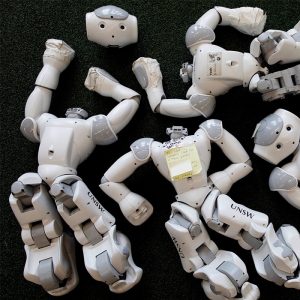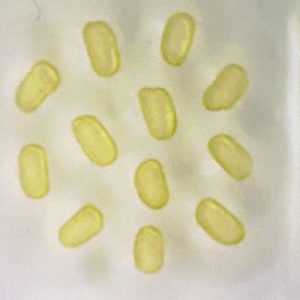Link About It: This Week’s Picks
Packaging made from soap, a seesaw at the border, the women who invented popular music and more

Bright Pink Seesaw Unites People at US-Mexico Border
 A set of neon pink seesaws along the US-Mexico border (in Sunland Park and Ciudad Juárez, respectively) have been installed by Ronald Rael and Virginia San Fratello—who work together as Rael San Fratello. The installation—called “Teetertotter Wall”—is playful and powerfully defiant. Rael calls it the “literal fulcrum for the US-Mexico relations” where it’s blindingly clear that “the actions that take place on one side have a direct consequence on the other side.” Rael’s post on Instagram comes just a day after the US Supreme Court approved the use of $2.5 billion in Pentagon funds to build part of the wall on the southern border. Read about the project at The Art Newspaper.
A set of neon pink seesaws along the US-Mexico border (in Sunland Park and Ciudad Juárez, respectively) have been installed by Ronald Rael and Virginia San Fratello—who work together as Rael San Fratello. The installation—called “Teetertotter Wall”—is playful and powerfully defiant. Rael calls it the “literal fulcrum for the US-Mexico relations” where it’s blindingly clear that “the actions that take place on one side have a direct consequence on the other side.” Rael’s post on Instagram comes just a day after the US Supreme Court approved the use of $2.5 billion in Pentagon funds to build part of the wall on the southern border. Read about the project at The Art Newspaper.
Europeans Increasingly Rejecting Air Travel

“I feel a little proud now to be taking the train,” Catherine Hellberg, a Swede traveling from Malmo to Berlin, says to Time. Her sentiment is part of a growing trend: Europeans are ever more inclined to take trains, cars and ships in favor of planes. This concern for the environment stretches across the continent and could be encouragement for Americans to follow suit. Perhaps the term “flygskam” (aka flight shame) will make its way Stateside too, as it “refers both to the guilt that individuals may feel when using a means of transportation estimated to contribute between 2 and 3% of total atmospheric carbon and to the shaming they may face should they persist in flying.” Read more at Time.
Packaging Made From Soap Drastically Reduces Waste
 Brands and consumers are becoming more thoughtful when it comes to biodegradable and eco-friendly packaging, but Central Saint Martins student Mi Zhou has taken it to another level for her project Soapack. While a single person goes through some 800 plastic shampoo bottles in their life, Zhou’s glorious vessels (conceived to contain shampoos, cleansers, et al) are actually made from soaps themselves. That means the packaging can be used as soap, and disintegrates entirely, drastically reducing waste. With designs reminiscent of antique perfume bottles, and delightful colorways, they are design objects too—while they last. Read more at Zhou’s site.
Brands and consumers are becoming more thoughtful when it comes to biodegradable and eco-friendly packaging, but Central Saint Martins student Mi Zhou has taken it to another level for her project Soapack. While a single person goes through some 800 plastic shampoo bottles in their life, Zhou’s glorious vessels (conceived to contain shampoos, cleansers, et al) are actually made from soaps themselves. That means the packaging can be used as soap, and disintegrates entirely, drastically reducing waste. With designs reminiscent of antique perfume bottles, and delightful colorways, they are design objects too—while they last. Read more at Zhou’s site.
Spotlighting the Women Credited with Inventing Popular Music
 NPR’s “Turning the Tables” series works to flip the script of various industries’ histories. One edition celebrates the women that invented the genre of American popular music: Bessie, Maybelle, Billie, Marian, Ella, Mary Lou, Celia and Rosetta. “The goal is to free the music of women and others who don’t fit the dominant straight-white-male paradigm from special categories, and put it at the center, where major conversations about culture cohere,” Ann Powers of NPR writes. Though the women on this list aren’t all included in halls of fame (where only 8% of honorees are women) or captured in high-budget biopics, they are nonetheless influential. In fact, Powers says women “have historically thrived in musical encounters and historical moments when everything felt fluid, less like it’s all on a sport scoreboard,” and thus, their contributions are less explicitly rewarded. Read more at NPR.
NPR’s “Turning the Tables” series works to flip the script of various industries’ histories. One edition celebrates the women that invented the genre of American popular music: Bessie, Maybelle, Billie, Marian, Ella, Mary Lou, Celia and Rosetta. “The goal is to free the music of women and others who don’t fit the dominant straight-white-male paradigm from special categories, and put it at the center, where major conversations about culture cohere,” Ann Powers of NPR writes. Though the women on this list aren’t all included in halls of fame (where only 8% of honorees are women) or captured in high-budget biopics, they are nonetheless influential. In fact, Powers says women “have historically thrived in musical encounters and historical moments when everything felt fluid, less like it’s all on a sport scoreboard,” and thus, their contributions are less explicitly rewarded. Read more at NPR.
Surfline’s Newest Feature Records Your Surf Sessions
 Surfline, the app and website trusted by surfers across the globe to report conditions, has launched a new feature on both platforms. Using their pre-existing livestream cameras (there are 500 cameras positioned at popular destinations around the world), surfers use the accompanying Surfline Apple Watch app and hit record before paddling out. The livestream cameras begin recording once prompted, and when users are done, they simply tap the watch again. Almost immediately, the footage will be available to share, watch or edit on the user’s phone. The app will also keep track of how many waves were caught and how much time was spent in the water—the only challenge is staying within the camera’s frame. Read more at Engadget.
Surfline, the app and website trusted by surfers across the globe to report conditions, has launched a new feature on both platforms. Using their pre-existing livestream cameras (there are 500 cameras positioned at popular destinations around the world), surfers use the accompanying Surfline Apple Watch app and hit record before paddling out. The livestream cameras begin recording once prompted, and when users are done, they simply tap the watch again. Almost immediately, the footage will be available to share, watch or edit on the user’s phone. The app will also keep track of how many waves were caught and how much time was spent in the water—the only challenge is staying within the camera’s frame. Read more at Engadget.
“Gender Reveal” Party Originator Speaks Out
 Jenna Karvunidis, a blogger credited with popularizing (and even inventing) the “gender reveal” party 11 years ago, is rethinking the trend—thanks to the child for whom her party was thrown. “PLOT TWIST!” she wrote in a Facebook post, before explaining that her child is “telling me ‘Mom, there are many genders. Mom, there’s many different sexualities and all different types,’ and I take her lead on that.” Karvunidis says that she regrets starting the trend, “I know it’s been harmful to some individuals. It’s 2019, we don’t need to get our joy by giving others pain,” she tells NPR, where you can read more.
Jenna Karvunidis, a blogger credited with popularizing (and even inventing) the “gender reveal” party 11 years ago, is rethinking the trend—thanks to the child for whom her party was thrown. “PLOT TWIST!” she wrote in a Facebook post, before explaining that her child is “telling me ‘Mom, there are many genders. Mom, there’s many different sexualities and all different types,’ and I take her lead on that.” Karvunidis says that she regrets starting the trend, “I know it’s been harmful to some individuals. It’s 2019, we don’t need to get our joy by giving others pain,” she tells NPR, where you can read more.
Kaiyun Motors’ Pint-Sized Electric Pickup Truck
 Though it certainly didn’t start this way, the electric vehicle market is saturated and quite difficult for automakers to break into. Differentiating can be nearly impossible, but Chinese automaker Kaiyun Motors is aiming to do so by offering pint-sized autos with top speeds around 30mph. Since May, the company has been selling their $7,999 truck in the US and European markets. Though the truck can’t outperform (in speed, towing or trunk load) larger iterations, it suffices for a majority of drivers. Read more at Quartz.
Though it certainly didn’t start this way, the electric vehicle market is saturated and quite difficult for automakers to break into. Differentiating can be nearly impossible, but Chinese automaker Kaiyun Motors is aiming to do so by offering pint-sized autos with top speeds around 30mph. Since May, the company has been selling their $7,999 truck in the US and European markets. Though the truck can’t outperform (in speed, towing or trunk load) larger iterations, it suffices for a majority of drivers. Read more at Quartz.
Sony’s Reon Pocket Wearable Air Conditioner
 On Sony’s crowdfunding platform in Japan, the slender, personal thermoelectric cooling unit known as the Reon Pocket can purportedly reduce a user’s body temperature by 13 degrees Celsius (or 23 degrees Fahrenheit). About the size of a card wallet, the Bluetooth-equipped device slips into a dedicated sleeve on the back of an accompanying undershirt. Its temperature can then be controlled through an iOS or Android app. It’s light and lasts about 24 hours per charge (via USB Type-C). And during the winter, it can be used as a heater. While funding now (for approximately $117), Sony plans to have the item ready by March 2020. Read more at The Verge.
On Sony’s crowdfunding platform in Japan, the slender, personal thermoelectric cooling unit known as the Reon Pocket can purportedly reduce a user’s body temperature by 13 degrees Celsius (or 23 degrees Fahrenheit). About the size of a card wallet, the Bluetooth-equipped device slips into a dedicated sleeve on the back of an accompanying undershirt. Its temperature can then be controlled through an iOS or Android app. It’s light and lasts about 24 hours per charge (via USB Type-C). And during the winter, it can be used as a heater. While funding now (for approximately $117), Sony plans to have the item ready by March 2020. Read more at The Verge.
The Race to Stop Autonomous Weapons
 AI expert and University of New South Wales professor Toby Walsh fears that autonomous weapons (those that require no human direction or activation) are not super-futuristic but much closer than many people think. Obviously, this is a scary concept. “You can’t have machines deciding whether humans live or die. It crosses new territory. Machines don’t have our moral compass, our compassion and our emotions. Machines are not moral beings,” Walsh says. The professor has been a part of a group lobbying internationally for countries to sign on preemptively to ban the development of such weapons. So far, only 28 of 200 have—the US, China, Russia, UK and others have yet to commit. Walsh argues, “The best time to ban such weapons is before they’re available.” Read more at the New York Times.
AI expert and University of New South Wales professor Toby Walsh fears that autonomous weapons (those that require no human direction or activation) are not super-futuristic but much closer than many people think. Obviously, this is a scary concept. “You can’t have machines deciding whether humans live or die. It crosses new territory. Machines don’t have our moral compass, our compassion and our emotions. Machines are not moral beings,” Walsh says. The professor has been a part of a group lobbying internationally for countries to sign on preemptively to ban the development of such weapons. So far, only 28 of 200 have—the US, China, Russia, UK and others have yet to commit. Walsh argues, “The best time to ban such weapons is before they’re available.” Read more at the New York Times.
The Accidental Liquid Magnet
 The first-ever permanent liquid magnet was made accidentally by scientists at the Lawrence Berkeley National Laboratory at the University of California. “For me, it sort of represents a sort of new state of magnetic materials,” Thomas Russell, the project’s lead researcher, says. The lab was working with iron oxides (compounds made from iron and oxygen) and a researcher there noticed that the particles within an object 3D-printed from the material were spinning in unison. Droplets (a blend of water, oil, and iron oxides) that had contact with the object then became permanently magnetized. Though an accident, this is just the beginning of an entirely new project that could revolutionize the use and look of magnets. Read more at Popular Mechanics.
The first-ever permanent liquid magnet was made accidentally by scientists at the Lawrence Berkeley National Laboratory at the University of California. “For me, it sort of represents a sort of new state of magnetic materials,” Thomas Russell, the project’s lead researcher, says. The lab was working with iron oxides (compounds made from iron and oxygen) and a researcher there noticed that the particles within an object 3D-printed from the material were spinning in unison. Droplets (a blend of water, oil, and iron oxides) that had contact with the object then became permanently magnetized. Though an accident, this is just the beginning of an entirely new project that could revolutionize the use and look of magnets. Read more at Popular Mechanics.
Link About It is our filtered look at the web, shared daily in Link and on social media, and rounded up every Saturday morning.












